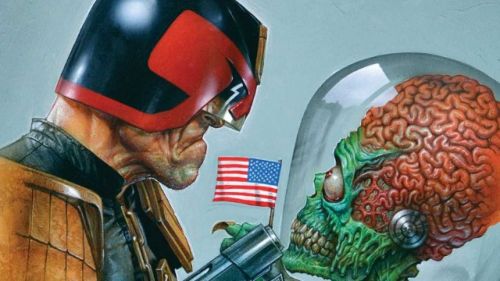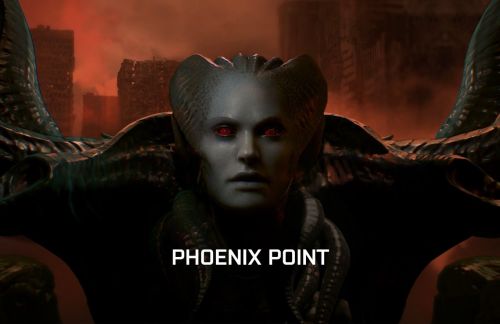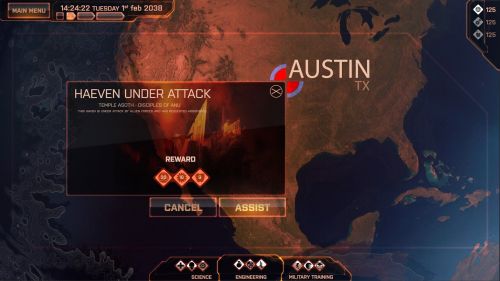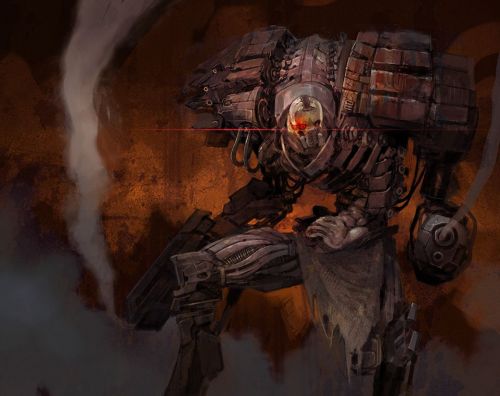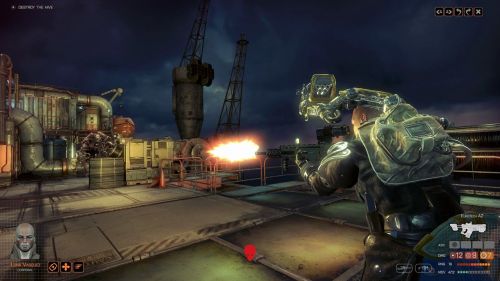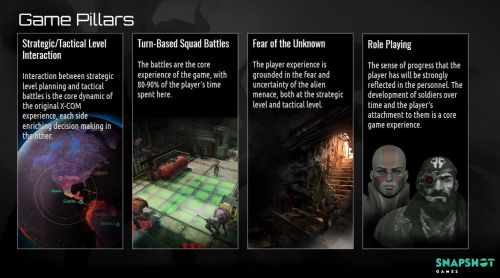RPG Codex Interview: Julian Gollop on Phoenix Point
RPG Codex Interview: Julian Gollop on Phoenix Point
Codex Interview - posted by Infinitron on Fri 5 May 2017, 20:59:05
Tags: Julian Gollop; Phoenix Point; Snapshot Games[Interview by sser]
You designed one of the most enduring games of all time in X-Com and with that has come a good measure and respect for the Gollop name. However, you never really threw your name into the spotlight, a la Sid Meier, Tim Schafer, Warren Spector, etc. Did your ‘name’ get signed away to Microprose or did you simply prefer to stay out of the limelight?
I had no specific intentions with regards to either being in or out of the limelight. I just wanted to make games.
Speaking of names, are there any people who have had a large influence on you and your game design recently or in the past?
Blimey. In the past there would be boardgame/RPG designers such Gary Gygax, Greg Costikyan, Marc W. Millar, and then computer game designers such as Mike Singleton, who made the excellent 'Lords of Midnight', and Sid Meier, of course. Recently Jake Solomon and Ananda Gupta for their work on the new XCOM series.
You’ve called board games a huge influence. Games like Armello, Thea, Tharsis, and even straight-adaptations like Heroes of Normandie are utilizing board game mechanics on the PC platform. Have you ever considered developing a board game, digital or physical?
I have been making boardgame prototypes since 1979. One of my early computer games, 'Chaos', was basically an implementation of a boardgame I made in 1981. The most recent one I made was a couple of weeks ago - a Star Wars card game for the children (they are nuts about Star Wars).
The developments of X-Com and X-Com: Apocalypse were very tumultuous. Publishers leering over your shoulder seemed to be a big part of those complications – how has your time been with Snapshot using Kickstarter and Fig to help fund development?
It's a very different process than working with a publisher, but it's still quite demanding. With a large number of backers you have lots of expectations, occasionally quite contradictory. It requires communication with the backers and regular updates of the project once it goes into early access. It's a tough discipline either way.
Got any online forums you post or used to post on? Do you keep a finger on the pulse of any online communities?
I check the XCOM and r/games subreddits fairly regularly, and now the Phoenix Point subreddit, which I am posting to.
What established franchise or setting would you most like to design a game for?
Judge Dredd is something I wanted to do for a long time. I proposed a Dredd game to Games Workshop back in 1985, but they went with someone else's proposal. My idea was a strategy/RPG game, but the published game was some crappy platformer.
Real-time strategy games exploded in popularity right about the time X-Com: Apocalypse got out the door, and X-Com: Apocalypse itself had a sort of ‘real-time’ option. Did you ever consider a full jump to the genre? Are you surprised by the sudden decline of the RTS genre in the face of MOBAs and the ironic return of turn-based strategy games?
We did do a real time game in 1998 called 'Magic & Mayhem', but it's not something that has particularly attracted me, largely because there was little original amidst the sea of RTS clones. I am not surprised by the decline of RTSs, no.
You mentioned that you once went to a conference where dozens if not hundreds of developers were trying to figure out pathfinding for their RTS games. I have to ask – was there ever a similar “just how do we fix this” roadblock in any of your titles?
Yes, with 'Rebelstar,' which I was developing for the ZX Spectrum in 1985, I intended it to be a two player game. I showed it to telecomsoft and they wanted a single player version. I hadn't a clue how to do it, so I spent two intensive weeks figuring out how to do pathfinding and AI for it, but it worked out well enough in the end. With 'Laser Squad Nemesis' I had to figure out a lot of stuff regarding linux, databases, email and so on for the server. We had no idea how to proceed with this at first.
There are a few ‘key’ games in the tactical turn-based genre that come up pretty frequently. X-Com is one of them, but two others that spring to mind are Jagged Alliance 2 and Silent Storm. Have you played these games and if so do you have any opinions on them, or perhaps about how they informed your own game design?
Yes, I have played them, but not a great deal. I don't think they have had any influence on my game design.
Phoenix Point’s teaser site described the game as, “Turn-Based Tactics, Turn-Based Strategy.” I’m most curious about the “Turn-Based Strategy” part. The original X-Com had more of a time-based approach to the geoscape. How will the turn-based approach look for Phoenix Point’s geoscape?
We are just implementing this now, so it's early days to say exactly how its going to end up working. Currently we are looking at 1 week turns during which a number of events occur for you to deal with.
Destructible terrain and a measure of verticality has been a common feature in your games. Just how destructible will the terrain be in Phoenix Point? How vertical?
It will be fully destructible apart from the ground, in a similar way to XCOM 2. The amount of verticality we implement is still to be decided. There are some interface issues that need to be resolved.
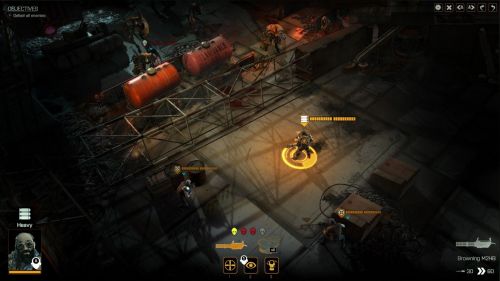
The ever undying Red Barrels make an appearance.
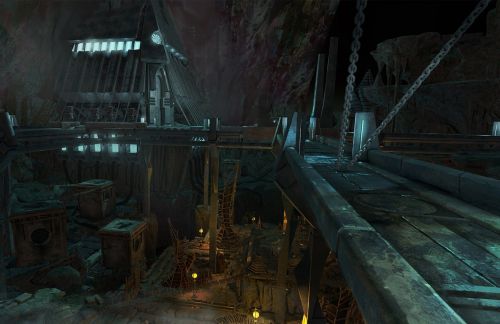
Map verticality and destruction are key points of design.
Speaking of levels, a lot of screenshots seem to be on narrow metalscapes like oil derricks or similar looking structures. What sort of other battlescapes can we expect to see? Rural, urban, things of that nature.
Each of the main factions has their own types of locations, structures and haven layouts. New Jericho has fortresses built on abandoned industrial or hilltop locations, the Desciples of Anu often use caves, whereas Synedrion have a number of elevated hi-tech platforms. There are also scavenging sites, which are primarily abandoned and infested military facilities, and alien structures of varying sizes.
Can we expect procedural design approach for both battlescapes and the geoscape?
There will be significant random elements in both the battle maps and the strategic map.
There’s an argument between 2-AP and Time Units. On Reddit, where the poll for this debate ranked low on importance, you said, “There was a slight preference towards Action Points - but the biggest vote was in the middle. I am not sure how to interpret this.” This leaves the question somewhat up in the air. However, I believe the style of the game itself will inform the decision here. XCOM1/2 used the 2-AP system, but it also implemented ‘ability’ usages, sticky cover-shooting, boxy maps, and other boardgame-like elements that seem to benefit from simplified move/shoot sequences. A TU-system, though my personal preference, would not have worked in the Firaxis versions of XCOM, nor do I think the 2-AP system would have worked well in X-Com, all things being the same.
So the big question: Time Units or 2-AP or a mix? Lot of folks chomping at the bit to know this one, ha.
It seems to be a really contentious issue. At the moment we have a nominal 2 action system which is extended by two things. Firstly, if an enemy becomes spotted during movement, then movement is halted, allowing the player to react by either moving or firing. Secondly a range of special actions can extend the number of things a character can do in a turn. These cost 'will points'. Overall its more flexible than modern XCOMs, but still keeps the pace of the game relatively high. My concern with a pure Time Unit system is that it can result in the most optimally effective play being very slow, and ultimately a bit boring. There may be other ways to solve this, and we will experiment some more without a doubt.
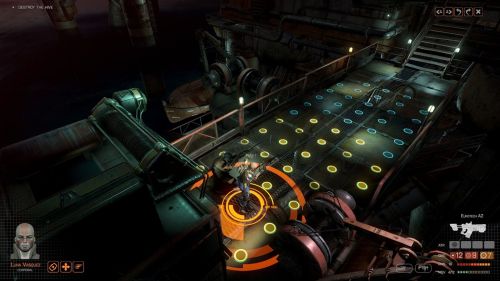
Early indications are a mix of 2-AP with a bit more flexibility than XCOM within the first 'move' tiles.
New-XCOM uses ‘abilities’ for its units, and in Ghost Recon: Shadow Wars you implemented something very similar, with the squad being a toolkit and each squaddie a unique ‘tool’ with abilities directed toward very specific solutions. Will Phoenix Point use a system similar to this or return to the hands-off approach of the original X-Com?
Phoenix Point uses willpower as a key stat. A character's willpower rating determines initial and maximum will points for a battle. Will points are spent on most special actions and abilities. Will points can be lost through injury, morale effects (such as comrades dying or facing a horrifying monster) and special enemy attacks. Forcing will points below zero may cause panic and loss of sanity. Will points can be recovered by resting or through special abilities, such as a leader rallying action.
Similarly, this sort of design lends itself to smaller squads. The problem players run into is that it sometimes presents a strong fail-state: you lose 1 of your 4, your squad is now noticeably weaker and thus more prone to further losses. On the grand scheme, if only 4-people can go into a battle, only 4-people are getting XP at a time. In XCOM, this led to ‘A-team’ development where players utilized a squad of terminators and, if this squad got wiped out, the game was essentially over. At the same time, smaller squads lends itself to tighter, more decision-emphasized gameplay.
What sort of squad compositions can we expect in Phoenix Point? And how can we expect the squads to develop on the strategy screen over time?
Squad sizes will range from 4 to 16 roughly, but the larger battles will be base defence missions (which don't happen too often). The player will be encouraged to keep squad sizes smaller due to experience point bonuses for smaller squads. The main limitations for squad size will be the availability of healthy soldiers and transport capacity. There won't be other arbitrary restrictions.
Enemy mutations seem to be a key-point in the game’s design. “Evolution” of objects in games has been a design that surfaces now and again in games, sometimes quite overtly (Spore, Impossible Creatures). With the creature designs, it almost seems like if you lost a squaddie you might see them and their lost equipment repurposed against you in a future monstrosity. What level of ‘evolution’ can we expect out of our enemies, or out of the world in general?
Alien mutations are based on archetypes which have a particular 'chassis', such as 'humanoid', mixed with body parts based on animal groups, such as 'cephalopod'. Each body part may mutate, providing different functions and capability. It's possible to have a human with relatively minor mutations, such as a tentacled arm, or to have something much more alien looking. The evolution aspect is based on a response to poor performance in battle. If a particular mutant type does badly, it will be mutated in a random fashion. If the new mutation does well, then more of them will be deployed. Each body part type has three levels of improvement, and when a random mutation occurs to a part that has been used previously, the next level of that part is used. Different alien archetypes will arise from different parts of the world, based on the animals that are native to that part of the world.
You mentioned on Reddit that the ‘pod popping’ XCOM system will not be in Phoenix Point. Excellent! But it begs the question, if the baddies are roaming about independently of the player, can we expect them to be pursuing their own objectives? And will they scare players by opening and slamming doors in the fog of war?
The enemies will indeed be pursuing objectives, depending on the mission. If they enemy is attacking a haven, or one of your bases, they will actively seek to destroy the vital functional elements of the base or haven. Aliens will also attempt to kill, eat or abduct civilians. If you are attacking then you may be able to infiltrate without alerting the enemy, but once alerted they will search and attack. Sound will be an important factor, especially since the aliens deploy a thick mist in many battles. This will be indicated visually as well.
Wayward shots leading to disaster or unplanned triumph is one of the charms of procedural combat. So let’s talk bullet physics! A shot in X-Com had the chance to fly by and hit something in the distance. In XCOM, this is (for the most part) not the case, as shots ‘glue’ themselves to their targets and either hit or miss. Chaotic misses were relegated almost entirely to rockets. How is this going to be handled in Phoenix Point?
We will use a proper trajectory system for rockets, bullets, grenades and so on. Missed shots will definitely hit something, and potentially damage or destroy it. We haven't figured out a way to represent to the player the potential outcome of such attacks yet.
Harkening back to X-Com: Apocalypse, Phoenix Point is seeing the return of ‘factions’ for the player to interact with. I tried to glean as much info as I could in this regard, but lips seem to be tight. The question is, will the factions in essence provide very different ways for the game to play out? Example, if you decide to operate alongside one faction over another, or overtly go to ‘war’ with a faction? Things of that nature.
Yes, the three factions do present three possible ways to fight the aliens, and ultimately to three possible endings. However, you can either ally with factions or fight them to get their secrets and tech. I can't reveal what the different endings of the game are at this stage.
Will there be populations outside of the factions, like roaming civilians still surviving out in the wastelands?
Yes, there are a fair number of independent havens, often with their own stories. The main factions will attempt to recruit them. There will also be isolated survivors found at scavenging sites and elsewhere.
One of your earlier games had a bit of free-for-all feel in terms of combat utilizing the environment. Will we see any soldiers equipping themselves with on-the-fly solutions such as with, oh I dunno, a lawnmower?
Ah, the lawnmower. An underestimated weapon.
How story-heavy can we expect the game to be?
There will be a lot of story elements, often attached to different places and encounters, but I would say the main driving force behind the story will be the research system, as with the original X-COM. In the case of Phoenix Point, however, you will need to make some choices that take you down one path while forsaking efforts in others.
Thanks for your time!
General Questions
You designed one of the most enduring games of all time in X-Com and with that has come a good measure and respect for the Gollop name. However, you never really threw your name into the spotlight, a la Sid Meier, Tim Schafer, Warren Spector, etc. Did your ‘name’ get signed away to Microprose or did you simply prefer to stay out of the limelight?
I had no specific intentions with regards to either being in or out of the limelight. I just wanted to make games.
Speaking of names, are there any people who have had a large influence on you and your game design recently or in the past?
Blimey. In the past there would be boardgame/RPG designers such Gary Gygax, Greg Costikyan, Marc W. Millar, and then computer game designers such as Mike Singleton, who made the excellent 'Lords of Midnight', and Sid Meier, of course. Recently Jake Solomon and Ananda Gupta for their work on the new XCOM series.
You’ve called board games a huge influence. Games like Armello, Thea, Tharsis, and even straight-adaptations like Heroes of Normandie are utilizing board game mechanics on the PC platform. Have you ever considered developing a board game, digital or physical?
I have been making boardgame prototypes since 1979. One of my early computer games, 'Chaos', was basically an implementation of a boardgame I made in 1981. The most recent one I made was a couple of weeks ago - a Star Wars card game for the children (they are nuts about Star Wars).
The developments of X-Com and X-Com: Apocalypse were very tumultuous. Publishers leering over your shoulder seemed to be a big part of those complications – how has your time been with Snapshot using Kickstarter and Fig to help fund development?
It's a very different process than working with a publisher, but it's still quite demanding. With a large number of backers you have lots of expectations, occasionally quite contradictory. It requires communication with the backers and regular updates of the project once it goes into early access. It's a tough discipline either way.
Got any online forums you post or used to post on? Do you keep a finger on the pulse of any online communities?
I check the XCOM and r/games subreddits fairly regularly, and now the Phoenix Point subreddit, which I am posting to.
What established franchise or setting would you most like to design a game for?
Judge Dredd is something I wanted to do for a long time. I proposed a Dredd game to Games Workshop back in 1985, but they went with someone else's proposal. My idea was a strategy/RPG game, but the published game was some crappy platformer.
Real-time strategy games exploded in popularity right about the time X-Com: Apocalypse got out the door, and X-Com: Apocalypse itself had a sort of ‘real-time’ option. Did you ever consider a full jump to the genre? Are you surprised by the sudden decline of the RTS genre in the face of MOBAs and the ironic return of turn-based strategy games?
We did do a real time game in 1998 called 'Magic & Mayhem', but it's not something that has particularly attracted me, largely because there was little original amidst the sea of RTS clones. I am not surprised by the decline of RTSs, no.
You mentioned that you once went to a conference where dozens if not hundreds of developers were trying to figure out pathfinding for their RTS games. I have to ask – was there ever a similar “just how do we fix this” roadblock in any of your titles?
Yes, with 'Rebelstar,' which I was developing for the ZX Spectrum in 1985, I intended it to be a two player game. I showed it to telecomsoft and they wanted a single player version. I hadn't a clue how to do it, so I spent two intensive weeks figuring out how to do pathfinding and AI for it, but it worked out well enough in the end. With 'Laser Squad Nemesis' I had to figure out a lot of stuff regarding linux, databases, email and so on for the server. We had no idea how to proceed with this at first.
There are a few ‘key’ games in the tactical turn-based genre that come up pretty frequently. X-Com is one of them, but two others that spring to mind are Jagged Alliance 2 and Silent Storm. Have you played these games and if so do you have any opinions on them, or perhaps about how they informed your own game design?
Yes, I have played them, but not a great deal. I don't think they have had any influence on my game design.
Phoenix Point/Game Design Questions
Phoenix Point’s teaser site described the game as, “Turn-Based Tactics, Turn-Based Strategy.” I’m most curious about the “Turn-Based Strategy” part. The original X-Com had more of a time-based approach to the geoscape. How will the turn-based approach look for Phoenix Point’s geoscape?
We are just implementing this now, so it's early days to say exactly how its going to end up working. Currently we are looking at 1 week turns during which a number of events occur for you to deal with.
Destructible terrain and a measure of verticality has been a common feature in your games. Just how destructible will the terrain be in Phoenix Point? How vertical?
It will be fully destructible apart from the ground, in a similar way to XCOM 2. The amount of verticality we implement is still to be decided. There are some interface issues that need to be resolved.

The ever undying Red Barrels make an appearance.

Map verticality and destruction are key points of design.
Speaking of levels, a lot of screenshots seem to be on narrow metalscapes like oil derricks or similar looking structures. What sort of other battlescapes can we expect to see? Rural, urban, things of that nature.
Each of the main factions has their own types of locations, structures and haven layouts. New Jericho has fortresses built on abandoned industrial or hilltop locations, the Desciples of Anu often use caves, whereas Synedrion have a number of elevated hi-tech platforms. There are also scavenging sites, which are primarily abandoned and infested military facilities, and alien structures of varying sizes.
Can we expect procedural design approach for both battlescapes and the geoscape?
There will be significant random elements in both the battle maps and the strategic map.
There’s an argument between 2-AP and Time Units. On Reddit, where the poll for this debate ranked low on importance, you said, “There was a slight preference towards Action Points - but the biggest vote was in the middle. I am not sure how to interpret this.” This leaves the question somewhat up in the air. However, I believe the style of the game itself will inform the decision here. XCOM1/2 used the 2-AP system, but it also implemented ‘ability’ usages, sticky cover-shooting, boxy maps, and other boardgame-like elements that seem to benefit from simplified move/shoot sequences. A TU-system, though my personal preference, would not have worked in the Firaxis versions of XCOM, nor do I think the 2-AP system would have worked well in X-Com, all things being the same.
So the big question: Time Units or 2-AP or a mix? Lot of folks chomping at the bit to know this one, ha.
It seems to be a really contentious issue. At the moment we have a nominal 2 action system which is extended by two things. Firstly, if an enemy becomes spotted during movement, then movement is halted, allowing the player to react by either moving or firing. Secondly a range of special actions can extend the number of things a character can do in a turn. These cost 'will points'. Overall its more flexible than modern XCOMs, but still keeps the pace of the game relatively high. My concern with a pure Time Unit system is that it can result in the most optimally effective play being very slow, and ultimately a bit boring. There may be other ways to solve this, and we will experiment some more without a doubt.

Early indications are a mix of 2-AP with a bit more flexibility than XCOM within the first 'move' tiles.
Phoenix Point uses willpower as a key stat. A character's willpower rating determines initial and maximum will points for a battle. Will points are spent on most special actions and abilities. Will points can be lost through injury, morale effects (such as comrades dying or facing a horrifying monster) and special enemy attacks. Forcing will points below zero may cause panic and loss of sanity. Will points can be recovered by resting or through special abilities, such as a leader rallying action.
Similarly, this sort of design lends itself to smaller squads. The problem players run into is that it sometimes presents a strong fail-state: you lose 1 of your 4, your squad is now noticeably weaker and thus more prone to further losses. On the grand scheme, if only 4-people can go into a battle, only 4-people are getting XP at a time. In XCOM, this led to ‘A-team’ development where players utilized a squad of terminators and, if this squad got wiped out, the game was essentially over. At the same time, smaller squads lends itself to tighter, more decision-emphasized gameplay.
What sort of squad compositions can we expect in Phoenix Point? And how can we expect the squads to develop on the strategy screen over time?
Squad sizes will range from 4 to 16 roughly, but the larger battles will be base defence missions (which don't happen too often). The player will be encouraged to keep squad sizes smaller due to experience point bonuses for smaller squads. The main limitations for squad size will be the availability of healthy soldiers and transport capacity. There won't be other arbitrary restrictions.
Enemy mutations seem to be a key-point in the game’s design. “Evolution” of objects in games has been a design that surfaces now and again in games, sometimes quite overtly (Spore, Impossible Creatures). With the creature designs, it almost seems like if you lost a squaddie you might see them and their lost equipment repurposed against you in a future monstrosity. What level of ‘evolution’ can we expect out of our enemies, or out of the world in general?
Alien mutations are based on archetypes which have a particular 'chassis', such as 'humanoid', mixed with body parts based on animal groups, such as 'cephalopod'. Each body part may mutate, providing different functions and capability. It's possible to have a human with relatively minor mutations, such as a tentacled arm, or to have something much more alien looking. The evolution aspect is based on a response to poor performance in battle. If a particular mutant type does badly, it will be mutated in a random fashion. If the new mutation does well, then more of them will be deployed. Each body part type has three levels of improvement, and when a random mutation occurs to a part that has been used previously, the next level of that part is used. Different alien archetypes will arise from different parts of the world, based on the animals that are native to that part of the world.
You mentioned on Reddit that the ‘pod popping’ XCOM system will not be in Phoenix Point. Excellent! But it begs the question, if the baddies are roaming about independently of the player, can we expect them to be pursuing their own objectives? And will they scare players by opening and slamming doors in the fog of war?
The enemies will indeed be pursuing objectives, depending on the mission. If they enemy is attacking a haven, or one of your bases, they will actively seek to destroy the vital functional elements of the base or haven. Aliens will also attempt to kill, eat or abduct civilians. If you are attacking then you may be able to infiltrate without alerting the enemy, but once alerted they will search and attack. Sound will be an important factor, especially since the aliens deploy a thick mist in many battles. This will be indicated visually as well.
Wayward shots leading to disaster or unplanned triumph is one of the charms of procedural combat. So let’s talk bullet physics! A shot in X-Com had the chance to fly by and hit something in the distance. In XCOM, this is (for the most part) not the case, as shots ‘glue’ themselves to their targets and either hit or miss. Chaotic misses were relegated almost entirely to rockets. How is this going to be handled in Phoenix Point?
We will use a proper trajectory system for rockets, bullets, grenades and so on. Missed shots will definitely hit something, and potentially damage or destroy it. We haven't figured out a way to represent to the player the potential outcome of such attacks yet.
Harkening back to X-Com: Apocalypse, Phoenix Point is seeing the return of ‘factions’ for the player to interact with. I tried to glean as much info as I could in this regard, but lips seem to be tight. The question is, will the factions in essence provide very different ways for the game to play out? Example, if you decide to operate alongside one faction over another, or overtly go to ‘war’ with a faction? Things of that nature.
Yes, the three factions do present three possible ways to fight the aliens, and ultimately to three possible endings. However, you can either ally with factions or fight them to get their secrets and tech. I can't reveal what the different endings of the game are at this stage.
Will there be populations outside of the factions, like roaming civilians still surviving out in the wastelands?
Yes, there are a fair number of independent havens, often with their own stories. The main factions will attempt to recruit them. There will also be isolated survivors found at scavenging sites and elsewhere.
One of your earlier games had a bit of free-for-all feel in terms of combat utilizing the environment. Will we see any soldiers equipping themselves with on-the-fly solutions such as with, oh I dunno, a lawnmower?
Ah, the lawnmower. An underestimated weapon.
How story-heavy can we expect the game to be?
There will be a lot of story elements, often attached to different places and encounters, but I would say the main driving force behind the story will be the research system, as with the original X-COM. In the case of Phoenix Point, however, you will need to make some choices that take you down one path while forsaking efforts in others.
Thanks for your time!
There are 35 comments on RPG Codex Interview: Julian Gollop on Phoenix Point






